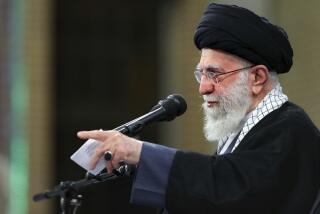Palestinian Brothers Executed 4 Days After Crime
- Share via
JERUSALEM — In the first use of capital punishment under the Palestinian Authority, a 10-man Palestinian firing squad executed two men Sunday who were convicted of killings that took place only last week.
The men, brothers Raed and Mohammed abu Sultan, were members of Palestinian Authority President Yasser Arafat’s own security forces. Their role in the deaths of two other men in a family feud in the Gaza Strip had prompted public protests from Gazans angry over frequent allegations of misuse of force by the powerful Palestinian security services.
But the case, which took just four days from killing to trial, sentencing and execution, outraged Palestinian human rights activists, who accused Arafat of denying the Abu Sultans justice in order to quell the public anger.
“If the Palestinian Authority is going to practice this kind of justice in Palestine, I think a very dark future is waiting for us,” said Bassam Eid, a prominent human rights activist and frequent Arafat critic. “Because President Arafat wanted to put an end to the anger in the street, he approved this judgment.”
Other Palestinians welcomed the executions, saying they believe that Arafat was sending a signal that he intends to rein in his police forces.
“I agree with these executions,” said Hatem Abdel Khader, a Palestinian legislator and one of a group of lawmakers that met with Arafat in Gaza on Sunday. “President Arafat told us today that he had approved the executions and that they would be an example that everybody is under the same law. This is good for the Palestinian people.”
*
A Gaza military court on Saturday found the Abu Sultans guilty of murder in the shooting deaths Thursday of Majdi Khalidi, 32, a member of Arafat’s general intelligence service, and his brother Mohammed Khalidi, 30, a college lecturer. A third Khalidi brother, Abdel Azim, 34, was shot in the legs during the confrontation, which took place at a wedding.
Other Abu Sultan brothers also were involved in the fight that broke out between the two families, who are longtime neighbors in the town of Nusseirat in central Gaza. One, Faris, was sentenced to death along with his brothers, but Arafat commuted the penalty to life imprisonment because Faris was not believed to have played a direct role in the killings.
The victims were prominent members of Arafat’s political faction, known as Fatah. On Sunday, members of the Khalidi family joined Fatah officials, security agency leaders and several legislators in witnessing the executions.
Journalists were not allowed to enter the police compound. But, from a position outside it, they heard a barrage of fire from Kalashnikov assault rifles over a security official’s two-way radio. They also heard shouts of “Allahu akbar,” or “God is Great,” part of the Muslim call to prayer, a Palestinian journalist said.
Palestinian police chief Ghazi Jabali later told reporters that the executions were justified under the “law of Allah and of man.”
Since 1994, when the Palestinians gained a measure of autonomy under the interim peace accords with Israel, Palestinian courts, which operate under a hodgepodge of Jordanian, British and Egyptian laws, have handed down the death penalty more than 20 times. Until Sunday, Arafat had always commuted the sentences, but anger has been growing among Palestinians over repeated human rights abuses and questionable arrests by his security agencies.
Palestinian activists, including Eid, have accused members of the security services of beatings, intimidation, false imprisonment and, lately, forcing several Palestinian contractors to pay taxes many times higher than they owe.
“Sometimes I think our security as Palestinian people is in danger from our security forces,” Khader said Sunday. “We must work to stop all these violations in our society, and this is what President Arafat is trying to do with these executions.”
But others questioned not only the summary nature of the judgment but the death penalty itself and, finally, whether the executions will help restore credibility to the security services.
“We need implemented laws and an independent and viable judiciary,” said Ali Jirbawi, director of the Palestinian Independent Commission for Citizens Rights. “People were outraged by the killings, but the executions won’t solve that. It’s a chain of events, and none of it is right.”
More to Read
Sign up for Essential California
The most important California stories and recommendations in your inbox every morning.
You may occasionally receive promotional content from the Los Angeles Times.













